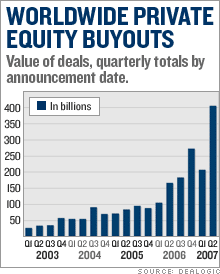Debt markets put to the testSeptember could be a critical month as bankers attempt to bring risky bond and loan offerings back to the market.LONDON (CNNMoney.com) -- The credit markets will face a critical test next month as bankers attempt to ramp up issuance of risky debt offerings. The market for high-yield debt and loans has been locked up this summer as investors have balked at risk. But as droves of Wall Streeters head back to work after Labor Day, they're expected to roll up their sleeves and start to try getting deals done.  "Right now everyone is just waiting. The expectation is for the primary market to open up again post-Labor Day," said Peter Acciavatti, a high-yield strategist at JPMorgan Chase in New York. How investors respond to these offerings could be an important sign of how much more "unwinding" there is left to go in the credit markets, where investors have been reassessing how much they're being paid for putting their money at risk. It could also set the tone for future buyout deals. Among the deals being closely watched is the debt offering related to the buyout of First Data (Charts, Fortune 500) by private equity firm Kohlberg Kravis Roberts. An estimated $22 billion needs to be raised for that deal, which is expected to close by the end of September. "If the deal can get done, it would be a great signal that things have definitely improved," said Dave Novosel, an analyst at Gimme Credit, a corporate bond research firm. Another deal that could be in jeopardy is the proposed sale of tax preparation company H&R Block's subprime mortgage unit Option One Mortgage to private equity firm Cerberus Capital Management. H&R Block (Charts, Fortune 500) said Thursday that it is in negotiations with Cerberus to modify the terms of the sale, which was announced in April. In a statement Thursday, H&R Block said "there can be no assurance" that a deal will close if it can not successfully renegotiate its agreement with Cerberus. Risky debt offerings have been on hold since June, when investors began pushing back on the loose lending terms that have helped fuel the leveraged buyout boom. The meltdown in the mortgage sector exacerbated the problem, triggering a broad flight to quality among investors that essentially froze the market for the summer. The paralysis in the market left banks holding debt they had intended to sell to yield-hungry investors in the credit markets. Some of these loans have already fallen in value, and banks are under pressure to get them off their balance sheets. "Banks don't want to sit on the funding and the market risk. If they can't put these deals through to the market, they will be forced to rip up agreements with some of the private equity houses," said Willem Sels, head of credit strategy at Dresdner Kleinwort in London. While credit markets have regained some of their poise recently, there's still uncertainty over whether the worst of the storm has passed or if there are more pockets of turbulence ahead. If investors remain on the sidelines, that could pose a challenge for the estimated $300 billion of debt that needs to make its way to the market. "Within the credit market, it's difficult to know where's the best place to be right now," said Philip Barleggs, head of fixed income at Insight Investment Management in London. Spreads have widened and attractive buying opportunities are cropping up, but "it's hard to know whether this is the right time to buy or if there are better opportunities farther down," he said. Loans could have the most trouble finding investors due to flagging structured finance activity. Collateralized loan obligations, pools of loans that are sold to investors in slices, have been responsible for taking up about 70 percent of leveraged loans. But now there is practically no structuring activity taking place. "From the loan perspective, we're not optimistic that we will see large deals or levered deals. It is our expectation that they will continue to have problems for potentially several months," Sels from Dresdner Kleinwort said. Bankers are going to have to tread carefully in these uneasy times, analysts said. They can't be too aggressive with what they bring out, or risk shutting down the market again. The offering related to the buyout of First Data, which agreed to be taken private by KKR in April for $28 billion, is a prime example of a deal that could go awry. First Data is planning to raise about $8 billion in bonds and $14 billion in loans. "It's got to be one of the ugliest of the LBOs that hasn't yet been financed," said Justin Monteith, an analyst at high-yield research firm KDP Investment Advisors. On the bond side, First Data would need a couple of years where it's allowed to pay interest by issuing more bonds instead of cash in order to not immediately run into financial trouble, Monteith said. These so-called pay-in-kind bonds became standard during the era of easy money. But now there's a backlash against them, as well as covenant-lite loans, which give borrowers more leeway when they run into trouble. "It feels like the whole acquisition and financing needs to be restructured," Monteith said. While the size of the offering is likely to be challenging, First Data has strong underlying fundamentals, said Novosel. Unlike some highly leveraged companies, it's been a strong performer, he said. If it's able to make it to market, it could signal a willingness among investors to embrace risk again, which would have implications for other offerings as well as future deals. "The first big deal to be announced will be an important test for the rest of the market and will be scrutinized closely to see what path it takes," Acciavatti said. |
|
